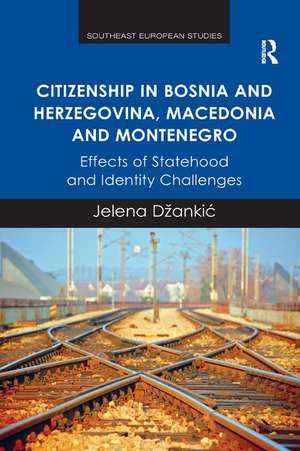Citizenship in Bosnia and Herzegovina, Macedonia and Montenegro: Effects of Statehood and Identity Challenges: Southeast European Studies
Autor Jelena Džankicen Limba Engleză Paperback – 12 oct 2017
| Toate formatele și edițiile | Preț | Express |
|---|---|---|
| Paperback (1) | 241.15 lei 6-8 săpt. | |
| Taylor & Francis – 12 oct 2017 | 241.15 lei 6-8 săpt. | |
| Hardback (1) | 766.12 lei 6-8 săpt. | |
| Taylor & Francis – 28 aug 2015 | 766.12 lei 6-8 săpt. |
Din seria Southeast European Studies
-
 Preț: 312.22 lei
Preț: 312.22 lei -
 Preț: 489.26 lei
Preț: 489.26 lei - 9%
 Preț: 1039.73 lei
Preț: 1039.73 lei - 18%
 Preț: 1000.27 lei
Preț: 1000.27 lei - 18%
 Preț: 994.95 lei
Preț: 994.95 lei - 12%
 Preț: 312.43 lei
Preț: 312.43 lei - 30%
 Preț: 849.05 lei
Preț: 849.05 lei -
 Preț: 383.12 lei
Preț: 383.12 lei -
 Preț: 351.66 lei
Preț: 351.66 lei -
 Preț: 383.12 lei
Preț: 383.12 lei -
 Preț: 379.77 lei
Preț: 379.77 lei -
 Preț: 384.86 lei
Preț: 384.86 lei - 18%
 Preț: 1006.92 lei
Preț: 1006.92 lei - 28%
 Preț: 821.29 lei
Preț: 821.29 lei -
 Preț: 381.98 lei
Preț: 381.98 lei -
 Preț: 385.84 lei
Preț: 385.84 lei -
 Preț: 383.68 lei
Preț: 383.68 lei -
 Preț: 411.42 lei
Preț: 411.42 lei -
 Preț: 385.62 lei
Preț: 385.62 lei - 31%
 Preț: 764.69 lei
Preț: 764.69 lei -
 Preț: 381.43 lei
Preț: 381.43 lei - 26%
 Preț: 764.20 lei
Preț: 764.20 lei -
 Preț: 361.13 lei
Preț: 361.13 lei - 18%
 Preț: 999.19 lei
Preț: 999.19 lei -
 Preț: 382.54 lei
Preț: 382.54 lei - 17%
 Preț: 241.15 lei
Preț: 241.15 lei - 19%
 Preț: 241.15 lei
Preț: 241.15 lei - 31%
 Preț: 767.67 lei
Preț: 767.67 lei -
 Preț: 469.34 lei
Preț: 469.34 lei - 18%
 Preț: 1000.45 lei
Preț: 1000.45 lei
Preț: 241.15 lei
Preț vechi: 296.35 lei
-19% Nou
Puncte Express: 362
Preț estimativ în valută:
46.15€ • 50.11$ • 38.77£
46.15€ • 50.11$ • 38.77£
Carte tipărită la comandă
Livrare economică 22 aprilie-06 mai
Preluare comenzi: 021 569.72.76
Specificații
ISBN-13: 9781138571983
ISBN-10: 1138571989
Pagini: 216
Dimensiuni: 156 x 234 mm
Greutate: 0.45 kg
Ediția:1
Editura: Taylor & Francis
Colecția Routledge
Seria Southeast European Studies
Locul publicării:Oxford, United Kingdom
ISBN-10: 1138571989
Pagini: 216
Dimensiuni: 156 x 234 mm
Greutate: 0.45 kg
Ediția:1
Editura: Taylor & Francis
Colecția Routledge
Seria Southeast European Studies
Locul publicării:Oxford, United Kingdom
Notă biografică
Jelena Dzanki PhD, University of Cambridge, is Marie Curie Fellow at the European University Institute, Florence, Italy. Her research interests include citizenship, nationalism, EU integration and the Western Balkans.
Recenzii
’Citizenship is an important dimension of any new state. Who is included and who is excluded is always important, but perhaps even more so in new states which are weak or unconsolidated. In this study, Dzanki brings expertise in South Eastern European politics and in the politics of citizenship to show us the extent to which state building projects and ethnic identities are interlinked, and how these linkages are exploited by political elites in order to strengthen their hold over the levers of power. This book will become an important part of the literature on the politics of the new states of South East Europe.’ Jo Shaw, University of Edinburgh, UK ’In multi-ethnic and unconsolidated states, citizenship can either unite or divide. In this important book Jelena Dzanki explains comprehensively how and why. Her systematic approach will serve as a model for comparative studies of citizenship beyond the Western Balkan cases examined.’ Rainer Bauböck, European University Institute, Florence, Italy
Cuprins
List of Abbreviations; Acknowledgments; Chapter 1 Introduction; Chapter 2 Transitional Triangle; Chapter 3 Historical Routes to Contemporary Citizenship; Chapter 4 The Politics of Contemporary Citizenship; Chapter 5 Intergroup Competition, Ideational and Symbolic Dimensions of Citizenship; Chapter 6 Dual Citizenship in Challenged and Unconsolidated States; Chapter 7 Citizenship en route to the European Union; Chapter 8 Conclusions;
Descriere
What happens to the citizen when states and nations come into being? How do the different ways in which states and nations exist define relations between individuals, groups, and the government? Are all citizens equal in their rights and duties in the newly established polity? Addressing these key questions in the contested and ethnically heterogeneous post-Yugoslav states of Bosnia and Herzegovina, Macedonia and Montenegro, this book reinterprets the place of citizenship in the disintegration of Yugoslavia and the creation of new states in the Western Balkans. Carefully analysing the interplay between competing ethnic identities and state-building projects, the author proposes a new analytical framework for studying continuities and discontinuities of citizenship in post-partition, post-conflict states.
